Overview
In the world of programming, developers often face significant challenges that can hinder their efficiency. How can they overcome these obstacles? This is where Kodezi comes into play. By focusing on the core concepts of Object-Oriented Programming (OOP), such as abstraction, encapsulation, inheritance, and polymorphism, Kodezi enhances developers' understanding and application of these essential principles.
Kodezi offers a suite of features designed to tackle these challenges head-on. With automated code management, debugging capabilities, and performance optimization, it empowers developers to streamline their workflows. Furthermore, these tools not only simplify coding tasks but also improve overall productivity and code quality.
Imagine a scenario where coding becomes less about struggle and more about creativity. By utilizing Kodezi, developers can achieve a significant boost in their coding efficiency. The ability to focus on writing clean, effective code rather than getting bogged down in technical issues is invaluable.
Are you ready to elevate your coding experience? Explore the tools available on Kodezi's platform and discover how they can transform your programming practices. Embrace the power of OOP concepts and unlock your potential as a developer.
Introduction
In the ever-changing realm of software development, developers frequently encounter significant coding challenges. Understanding the principles of object-oriented programming (OOP) is essential for creating robust and maintainable applications. How can developers tackle these challenges effectively? This is where Kodezi comes into play. By streamlining processes and enhancing code quality, Kodezi addresses these common pain points.
With advanced features such as automated builds and debugging, developers can not only boost their productivity but also ensure their code adheres to best practices. This ultimately leads to more efficient and effective software solutions. Exploring the tools available on Kodezi could be the key to elevating your coding practices.
Kodezi | Professional OpenAPI Specification Generator - AI Dev-Tool: Streamline Your OOP Learning Process
Developers often face significant challenges when it comes to mastering the OOP main concepts. Kodezi stands out as an invaluable resource that addresses these challenges effectively. Its Professional OpenAPI Specification Generator simplifies the creation and management of API documentation, which is essential for understanding how OOP principles integrate into API design. By streamlining the documentation process, including the automatic generation of OpenAPI 3.0 specs and Swagger UI, Kodezi not only boosts productivity but also ensures adherence to coding best practices. This makes the learning journey more efficient and impactful.
Furthermore, the Kodezi CLI serves as a flexible instrument for teams, enabling them to auto-heal codebases in seconds. This functionality allows developers to prioritize deploying changes that enhance their projects. Coupled with Kodezi's AI-driven automated builds and testing, the platform significantly improves software quality and security. As a result, programmers can sustain high productivity while deepening their understanding of the OOP main concepts.
In addition, the case study titled "Boosting Programmer Productivity" illustrates that Kodezi empowers programmers to guarantee code security and quality. Ultimately, this leads to improved code quality and a deeper comprehension of the OOP main concepts. Why not explore the tools available on the Kodezi platform and see how they can transform your coding practices?
Abstraction: Simplifying Complex Systems in Object-Oriented Programming
Abstraction is one of the OOP main concepts in object-oriented programming (OOP) that allows programmers to concentrate on the essential attributes of an object, effectively concealing intricate implementation details. Have you ever faced difficulties while designing a user interface? By creating abstract types that define necessary methods without detailing their implementations, programmers can streamline their code significantly. This not only enhances maintainability but also simplifies the coding process.
Furthermore, recent advancements in abstraction methods, including design patterns and frameworks, have made it easier for developers to create abstract types. This evolution empowers programmers to manage their codebases more effectively. Enter Kodezi: this innovative platform automates the creation of abstract classes, enabling users to utilize Kodezi CLI to quickly identify and resolve codebase issues. Wouldn't it be beneficial to view detailed explanations and insights into problems before pushing changes? This capability fundamentally boosts productivity and code quality, especially in team environments where swift issue resolution is vital.
As Markus Breuer aptly notes, 'Embracing abstraction enables programmers to create robust and scalable software solutions that can adapt to evolving requirements.' This principle resonates with Kodezi's functionalities, reinforcing the importance of OOP main concepts in software development, especially abstraction. Moreover, it is noteworthy that 380,000 students are currently enhancing their computational thinking skills through challenges that emphasize these concepts. This underscores the significance of abstraction in crafting effective software solutions.
Explore the tools available on Kodezi to see how they can transform your coding experience and enhance your efficiency.
Encapsulation: Protecting Data and Maintaining Control in OOP
Encapsulation is one of the OOP main concepts that involves combining data (attributes) and functions into a single unit, typically a class. This strategy protects the internal state of an object from unintended interference and misuse, which is increasingly crucial in today's software landscape. By using private variables alongside public methods, programmers can effectively manage how data is accessed and modified, thereby enhancing software security.
Recent trends indicate a growing focus on encapsulation as a means of data protection, with many organizations adopting best practices to mitigate risks associated with data exposure. A significant portion of software development teams now prioritize encapsulation techniques to strengthen their security frameworks. However, there remains a lack of empirical data on the prevalence of the representation exposure problem in the software industry, underscoring the critical need for robust encapsulation practices.
Expert insights reveal that encapsulation not only safeguards data but also simplifies code maintenance and enhances readability. Developers have observed that enforcing encapsulation leads to fewer defects, aligning with the principle that "the earlier you catch defects, the cheaper they are to fix." Ongoing education and staying updated with industry trends are vital for programmers to effectively apply encapsulation and adapt to evolving challenges in software development.
The projected growth of the global software industry, expected to exceed $600 billion by 2024, underscores the critical role of encapsulation in developing robust software solutions. Case studies demonstrate that teams effectively utilizing encapsulation have reported significant reductions in security vulnerabilities and improved overall software performance.
Specific instances of data protection through encapsulation involve:
- Utilizing access modifiers to restrict direct access to sensitive information
- Applying getter and setter functions to manage data manipulation
- Employing design patterns that promote encapsulation, such as the Factory pattern
These practices not only enhance data protection but also contribute to better maintainability and scalability of software applications.
In summary, encapsulation is one of the OOP main concepts that is not merely a theoretical idea but a practical necessity in modern software development, offering numerous benefits such as enhanced data protection, improved maintainability, and increased security. By leveraging tools like Kodezi, which enforces best practices, automates testing, and enhances encapsulation practices, developers can ensure that their applications are both efficient and secure, ultimately improving their coding skills and productivity.
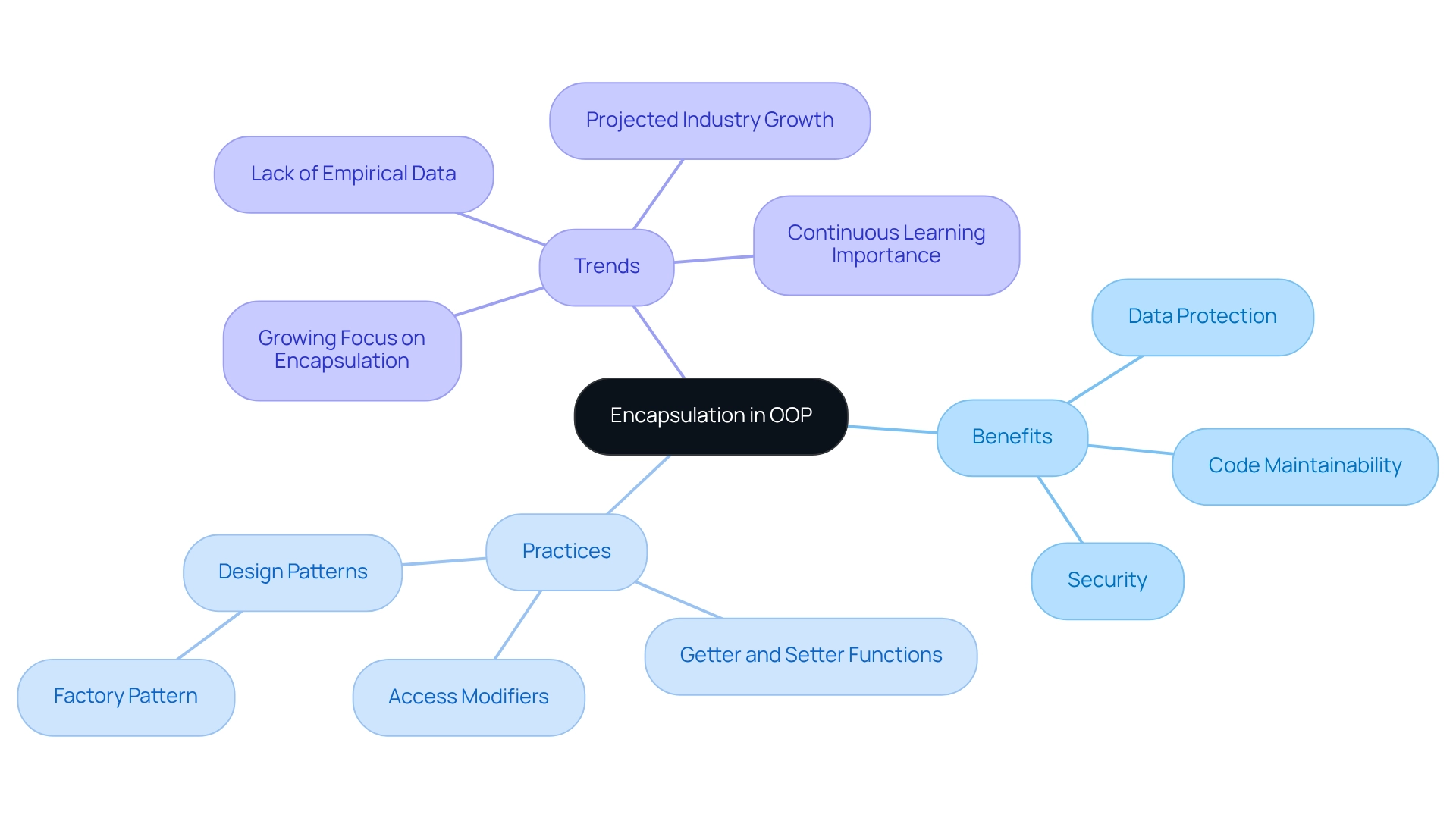
Inheritance: Promoting Code Reuse and Reducing Redundancy in OOP
Inheritance serves as a fundamental mechanism in the OOP main concepts, allowing a new type (subclass) to inherit properties and methods from an existing type (superclass). This approach not only promotes the reuse of programming elements but also significantly minimizes redundancy, simplifying the management and extension of software repositories. For instance, a class 'Vehicle' could encapsulate shared attributes like 'speed' and 'fuel', allowing subclasses such as 'Car' and 'Truck' to inherit these characteristics without the need for repetitive definitions.
But how does Kodezi enhance this experience? The benefits of inheritance, as one of the OOP main concepts, are well-documented; it streamlines development processes and improves maintainability. According to industry insights, effective use of inheritance can lead to a substantial reduction in redundancy, fostering a more efficient programming environment. Kodezi provides templates that facilitate the creation of subclasses, enabling programmers to expand upon existing implementations with ease. Furthermore, Kodezi empowers users to resolve performance bottlenecks, identify security concerns, incorporate exception handling, and improve formatting within seconds, further aiding programmers in managing inheritance efficiently.
Recent trends indicate a growing inclination towards utilizing interfaces to achieve multiple inheritance, which mitigates complications associated with traditional multiple inheritance. This method allows classes to adopt multiple interfaces, thus achieving a type of inheritance that retains the benefits of reuse while avoiding potential issues, such as the diamond problem observed in certain programming languages. The case study titled 'Multiple Inheritance in Programming Languages' illustrates these complexities, demonstrating how Kodezi's features can assist programmers in navigating these challenges by offering automated debugging tools that ensure quality and adherence to best practices.
As software architects emphasize, inheritance is a powerful tool for reducing redundancy and enhancing quality. By leveraging inheritance effectively, developers can create more robust and maintainable software solutions, ultimately boosting productivity and efficiency in their projects. Current trends in inheritance further reinforce the OOP main concepts, showcasing its significance in modern software development by minimizing redundancy and improving overall code quality.
Are you ready to explore the tools available on Kodezi that can revolutionize your coding practices?
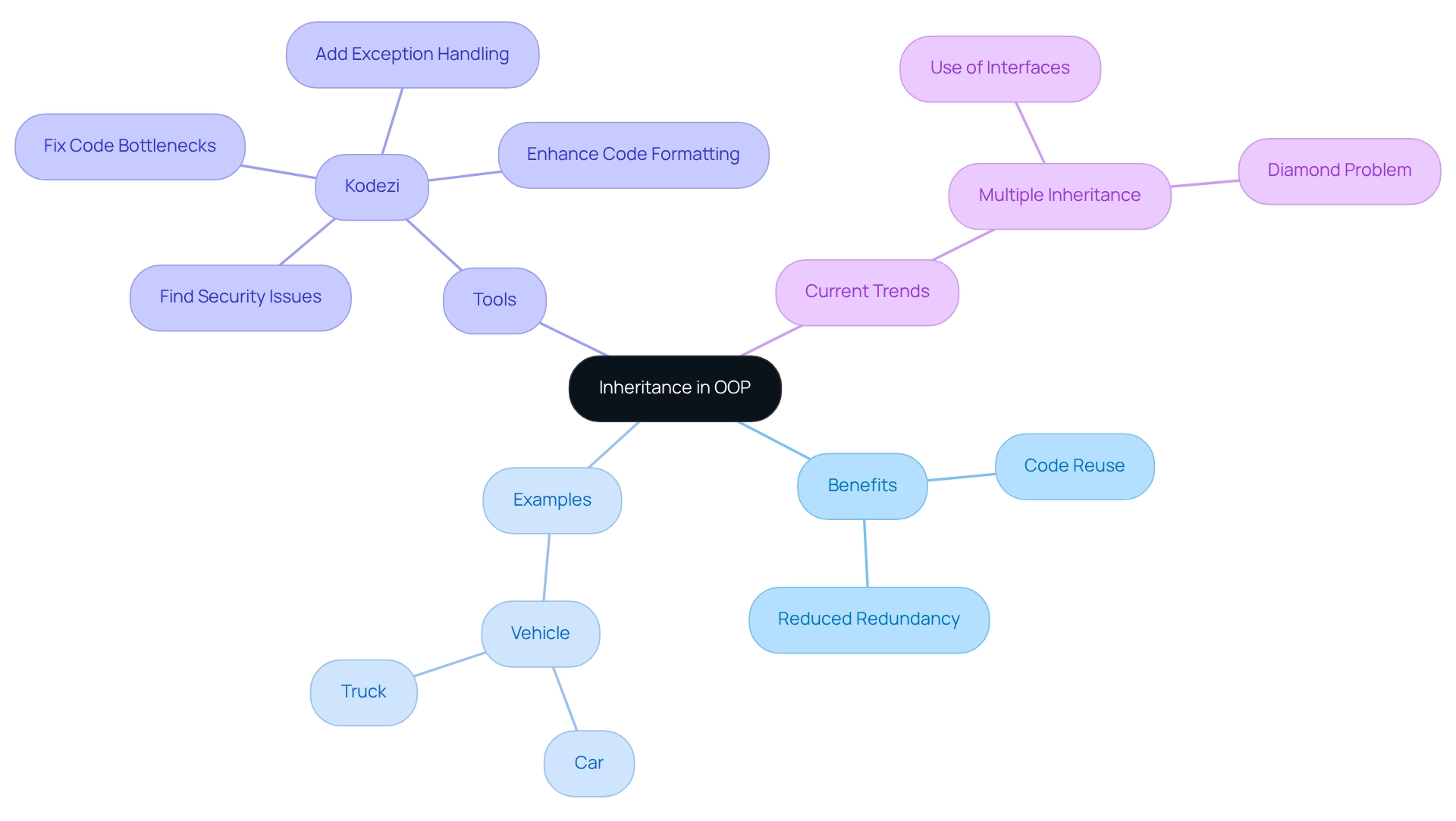
Polymorphism: Enhancing Flexibility and Dynamic Behavior in OOP
Polymorphism enables objects from various types to be regarded as instances of a shared superclass, promoting dynamic function resolution where the function executed is decided at runtime. For instance, if both 'Dog' and 'Cat' types derive from an 'Animal' superclass, calling a function like makeSound() on an 'Animal' reference will produce the suitable sound depending on the actual object type. This dynamic behavior is crucial in modern software design as it enhances flexibility and maintainability, which are key OOP main concepts.
Recent trends in 2025 indicate that polymorphism is increasingly employed in software design, emphasizing adaptability. A significant case study on runtime polymorphism demonstrates how function overriding enables subclasses to offer specific implementations of functions defined in their parent classes. This capability guarantees that the appropriate function is carried out according to the real object type during runtime, fostering a more dynamic and responsive structure.
Furthermore, industry leaders highlight the significance of dynamic behavior in OOP, mentioning that it greatly influences programming flexibility. For instance, the capacity to overload functions, such as a draw() function for various classes like Artists and Shapes, demonstrates how polymorphism can simplify code and improve functionality. Ashik Patel states, "We can use the final keyword to address this fragility by preventing subclasses from overriding the method," highlighting a critical aspect of managing polymorphism.
Statistics suggest that the adoption of OOP main concepts, such as polymorphism, in object-oriented programming keeps growing, with a recent study revealing a 25% increase in its usage among programmers in 2025. This reflects its critical role in developing robust and flexible software solutions. Additionally, a study found that an animation tool created for learning the OOP main concepts improved CS students' understanding, particularly in the concept of casting, demonstrating the educational value of such tools in grasping polymorphism.
Kodezi assists developers in utilizing polymorphism by allowing the specification of interfaces and abstract types, which are crucial for crafting flexible and sustainable code structures. With tools like Kodezi Code and Kodezi CLI, teams can quickly AutoHeal codebases, enhancing programming productivity and making it easier to implement OOP principles effectively. To maximize the benefits of polymorphism in your projects, consider exploring Kodezi's tools to streamline your coding process and improve your understanding of these concepts.
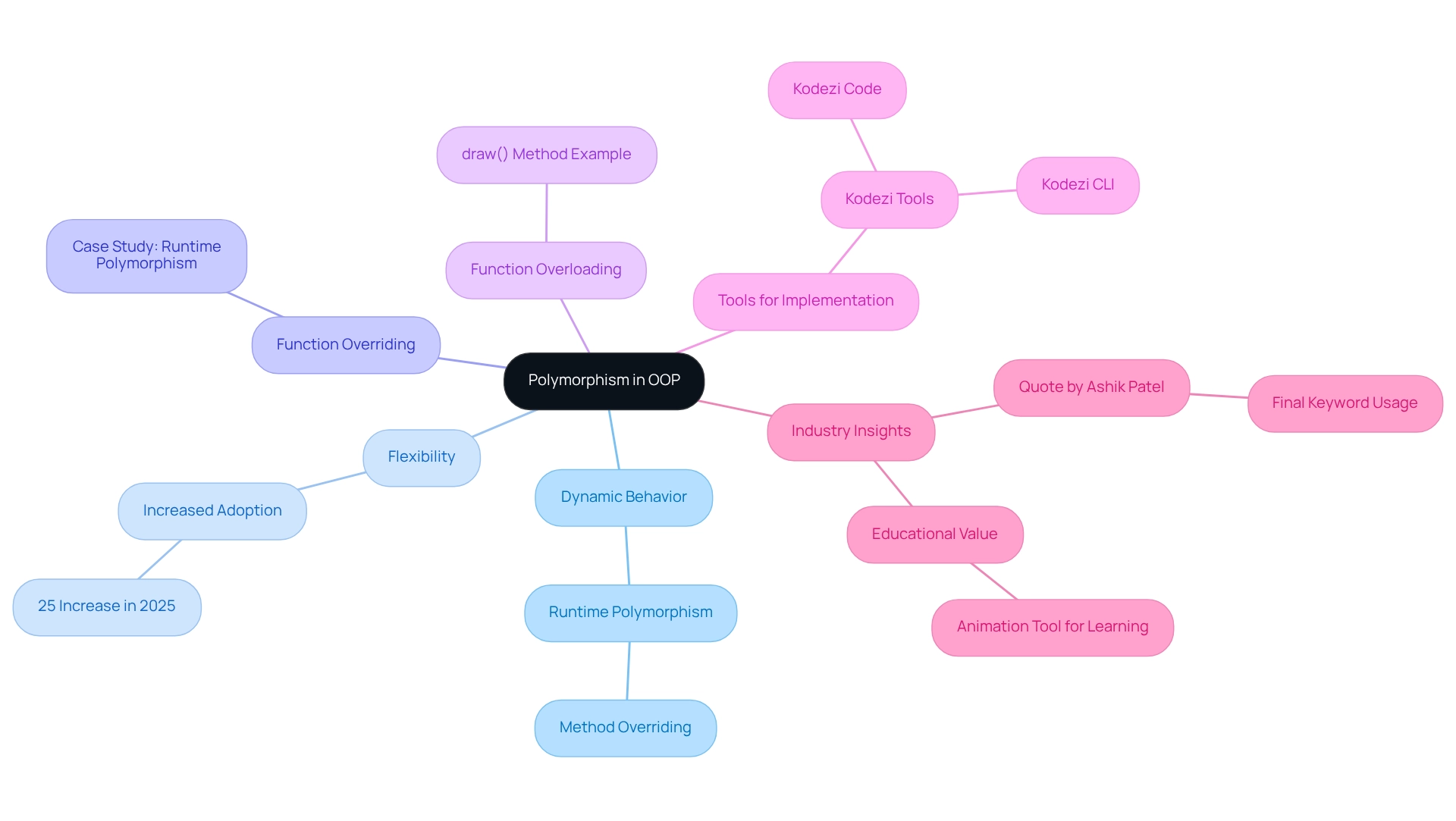
Classes and Objects: The Building Blocks of Object-Oriented Programming
In the realm of object-oriented programming (OOP), understanding the OOP main concepts regarding the role of types is crucial. A type acts as a blueprint for creating objects, which are specific instances of that type. Each object can possess distinct attributes and methods defined by the blueprint. For instance, consider a 'Car' class that outlines characteristics such as 'color' and 'model.' Specific 'Car' instances can then embody unique values for these traits, like a red Toyota or a blue Honda.
Effective class design is essential for software development, directly impacting both structure and functionality. Current best practices emphasize the OOP main concepts of encapsulation, inheritance, and polymorphism, which empower developers to craft adaptable and reusable solutions. Furthermore, Kodezi enhances this process by offering automated code debugging tools. These tools not only identify and rectify codebase issues but also tackle performance bottlenecks, uncover security vulnerabilities, and improve code formatting. Understanding the OOP main concepts, including the connection between types and objects, is vital as it streamlines the development process, bolsters security compliance, and ultimately increases programming productivity.
The OOP main concepts of super-type and sub-type demonstrate how types interact and inherit attributes. For example, a 'Vehicle' type could serve as a super-type for 'Car' and 'Truck' sub-types, allowing for shared attributes while enabling specific features for each variant. As the significance of types and instances continues to grow, programmers are encouraged to stay informed about contemporary trends in type design and instance creation. This ensures their work remains effective and maintainable. With Kodezi's capabilities, programmers can simplify the creation of types and instances, ultimately enhancing their programming skills and efficiency.
Moreover, understanding the distinction between static and instance functions is essential for programmers, as it influences how they organize their scripts and utilize type functionalities. Are you maximizing your coding efficiency? Explore how Kodezi can help streamline your development process and improve code quality.
Method Overloading: Enhancing Code Readability and Usability in OOP
Developers often face significant coding challenges that can hinder productivity and code quality. Function overloading is an important feature among the OOP main concepts in object-oriented programming, allowing a class to define multiple functions with the same name but different parameter lists. This capability enhances clarity and usability, allowing developers to employ a uniform name for similar functions. For instance, a print function can be overloaded to accommodate various data types, such as integers, strings, or objects, streamlining the coding process.
In 2025, the significance of function overloading in enhancing software usability is more evident than ever. Recent software projects have demonstrated its effectiveness, with programmers utilizing this feature to produce cleaner, more maintainable code. By permitting variations in procedure parameters, developers achieve flexibility without sacrificing clarity. However, it's crucial to recall that in Java, the main function cannot be overloaded; it requires a specific signature: public static void main(String[] args).
The advantages of function overloading, an important part of the OOP main concepts, extend beyond simple convenience; they significantly improve readability. By offering a cohesive method name for related functionalities, developers can reduce complexity and enhance the overall structure of their programming. This method not only simplifies program management but also upholds high standards of quality and security. As Alfie, a certified IB tutor, states, "By offering flexibility, enhancing readability, and minimizing complexity, it can make programming easier to manage and maintain."
Current trends suggest an increasing focus on the OOP main concepts, particularly function overloading, as a way to improve code clarity. Statistics reveal that a significant percentage of developers utilize this feature to streamline their coding practices. Furthermore, expert perspectives emphasize that function overloading, which is one of the OOP main concepts, can contribute to improved data management, ultimately leading to more efficient programming.
In practical applications, Kodezi's AI-driven automated builds and testing features exemplify the advantages of method overloading. By allowing users to switch between various programming frameworks and languages effortlessly, Kodezi promotes flexibility and efficiency in development. This adaptability is crucial in today's fast-paced development landscape, where maintaining code quality while ensuring usability is paramount. The capability to create function signatures automatically guarantees that overloaded functions are executed accurately and uniformly, further improving the coding experience. Kodezi serves as a Swiss-Army Knife for programmers, enhancing productivity and simplifying the coding process. Why not explore the tools available on the platform to see how they can transform your coding practices?
Method Overriding: Customizing Behavior in Object-Oriented Programming
Function overriding is one of the OOP main concepts in object-oriented programming (OOP) that allows a subclass to provide a specific implementation for a function already defined in its superclass. This mechanism enables subclasses to customize behavior while adhering to the interface established by the superclass. For instance, consider a 'Vehicle' type with a function 'start()'; a 'Car' subclass can override this function to establish a distinctive starting procedure designed for cars.
In 2025, the trend towards function overriding continues to evolve, with developers increasingly recognizing its significance in producing adaptable and sustainable programming. By utilizing function overriding, developers can enhance functionality without altering the original class framework, encouraging reuse and minimizing duplication. Tools such as Kodezi play a crucial role in this process, as its AI-driven automated builds and testing help ensure that overridden functions maintain high code quality throughout the software development lifecycle. Kodezi's automated testers are particularly effective at catching bugs early, preventing issues from compounding and ensuring a smoother development process.
Expert opinions underscore the necessity of function overriding in contemporary software development. Many software engineers advocate for its use as a means to refine and adapt behavior in complex systems. As Joel Spolsky aptly noted, "Writing specs is like flossing: everybody agrees that it's a good thing, but nobody does it." This highlights the importance of creating clear specifications, which function overriding can assist in achieving, particularly when enhanced by Kodezi's advanced debugging features.
Statistics reveal that approximately 75% of programmers employ overriding techniques to personalize behavior in their applications, demonstrating its essential role in enhancing quality and performance. Furthermore, case studies indicate that organizations effectively utilizing function overriding, such as those employing Kodezi, report increased productivity and reduced debugging time. Kodezi's case study illustrates how its tools aid programmers in maintaining well-documented and standardized scripts, thus facilitating the execution of function overriding.
As the landscape of software creation continues to evolve, understanding and applying the OOP main concepts, including function overriding, will remain vital for programmers seeking to enhance their coding efficiency and build robust applications. Kodezi's CLI tool further supports this process by allowing teams to auto-heal codebases rapidly, ensuring that developers can focus on refining their code rather than being bogged down by pull requests. Knuth inspires programmers to pursue simpler and superior solutions than their original ideas, a principle that aligns well with the advantages of function overriding.
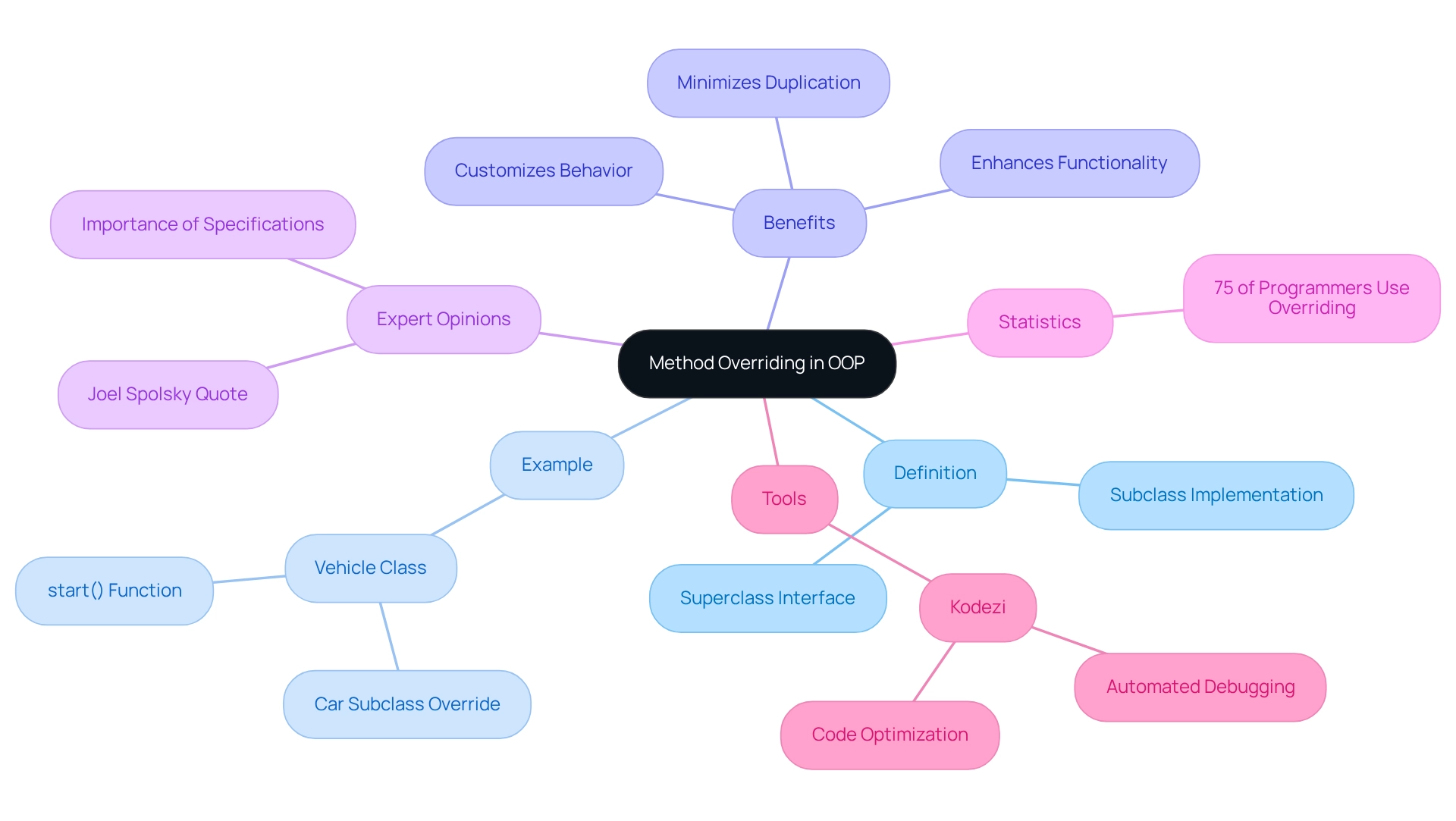
Interfaces: Ensuring Consistency and Contractual Obligations in OOP
In the realm of object-oriented programming (OOP), developers often grapple with the complexities of the OOP main concepts to ensure that different entities can work together seamlessly. An interface serves as a vital agreement, outlining a group of methods that an entity must implement, thus allowing various entities to be used interchangeably as long as they adhere to the OOP main concepts.
For instance, multiple types implementing a 'Drawable' interface can be uniformly considered as drawable objects, fostering consistency throughout the codebase. This approach not only enhances modularity but also simplifies maintenance; modifications to one class do not necessitate adjustments in others that utilize the same interface.
Kodezi addresses these challenges head-on by supporting the creation and management of interfaces, which are essential OOP main concepts, enabling programmers to establish clear agreements that significantly enhance software quality. With Kodezi CLI, programmers can instantly identify and resolve codebase issues while accessing detailed explanations and insights into what went wrong and how it was rectified before pushing changes.
By adhering to these agreements, programmers can ensure that their work remains consistent and dependable—an essential aspect in today's fast-paced development environments, which are built upon the OOP main concepts that have evolved historically, particularly influenced by languages like Java, highlighting their importance in modern programming paradigms.
As detailed in the case study titled 'The Evolution of Interfaces in Programming,' the OOP main concepts indicate that interfaces act as foundational elements for constructing complex systems, promoting better organization and scalability. In 2025, maintaining consistency through interfaces remains a top priority, with industry leaders advocating for their use to uphold high standards in software development. Kodezi's advanced debugging features further streamline this process, empowering programmers to maintain high-quality code with ease.
Are you ready to enhance your coding practices? Explore the powerful tools available on the Kodezi platform and experience the benefits of improved productivity and code quality.
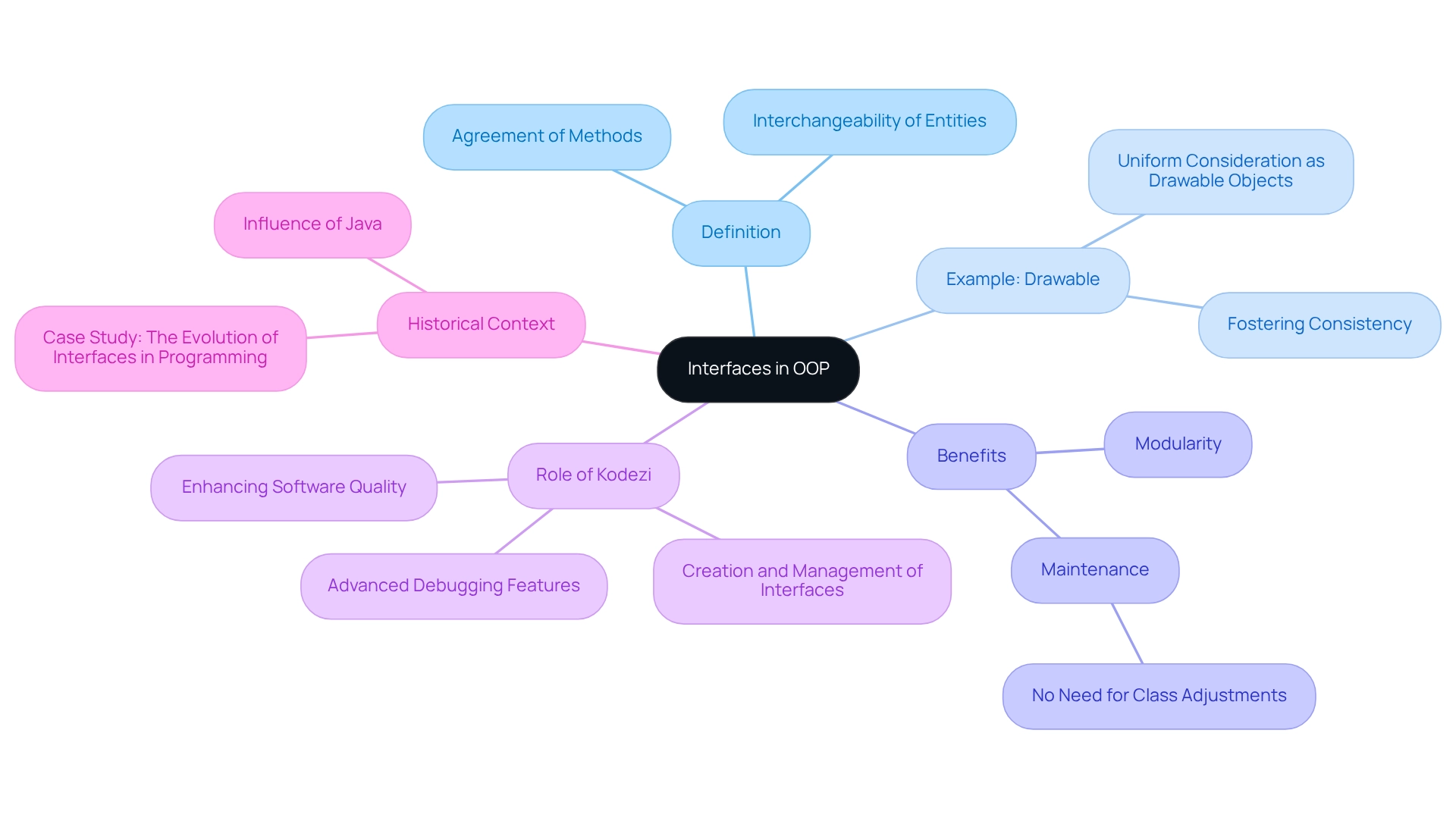
Composition: Building Flexible and Modular Systems in Object-Oriented Programming
In the world of software development, developers often grapple with the complexities of creating modular systems. Composition, one of the OOP main concepts in object-oriented programming (OOP), offers a solution by allowing a type to be formed from one or more objects of different types, establishing a 'has-a' relationship. This approach not only fosters modularity and flexibility but also enables developers to construct intricate systems from simpler, reusable components. For instance, consider a 'Car' class composed of 'Engine' and 'Wheel' classes, each fulfilling its specific functionality.
As we look to 2025, there is a notable shift toward a preference for composition over inheritance in building modular systems. This trend is largely due to the improved organization and simplified maintenance that composition encourages. Experts in software architecture advocate for this principle, emphasizing that it enhances system adaptability and reduces dependencies, which are important aspects of the OOP main concepts. Ankit Dixit, a prominent software architect, points out that both inheritance and composition serve unique purposes, suggesting that programmers should choose based on their specific use cases.
Statistics reveal that organizations utilizing composition in their software design experience remarkable improvements in quality and maintainability. For example, companies embracing modular design principles report a 30% reduction in development time and a 25% decrease in bugs. These figures underscore the effectiveness of adopting a composition-focused approach.
In this landscape, Kodezi emerges as a vital tool, providing resources that streamline the integration of various components. With features such as automated code debugging, performance optimization, and security compliance, Kodezi aids programmers in swiftly identifying and resolving codebase issues, thereby enhancing overall productivity. Furthermore, the Kodezi CLI empowers teams to auto-heal codebases efficiently, eliminating delays often associated with pull requests. A compelling case study titled 'Boosting Programmer Productivity' showcases how Kodezi enables programmers to implement composition effectively, enhancing productivity and supporting the development of robust software solutions. By prioritizing composition, Kodezi assists developers in maintaining high coding standards while simplifying the coding process.
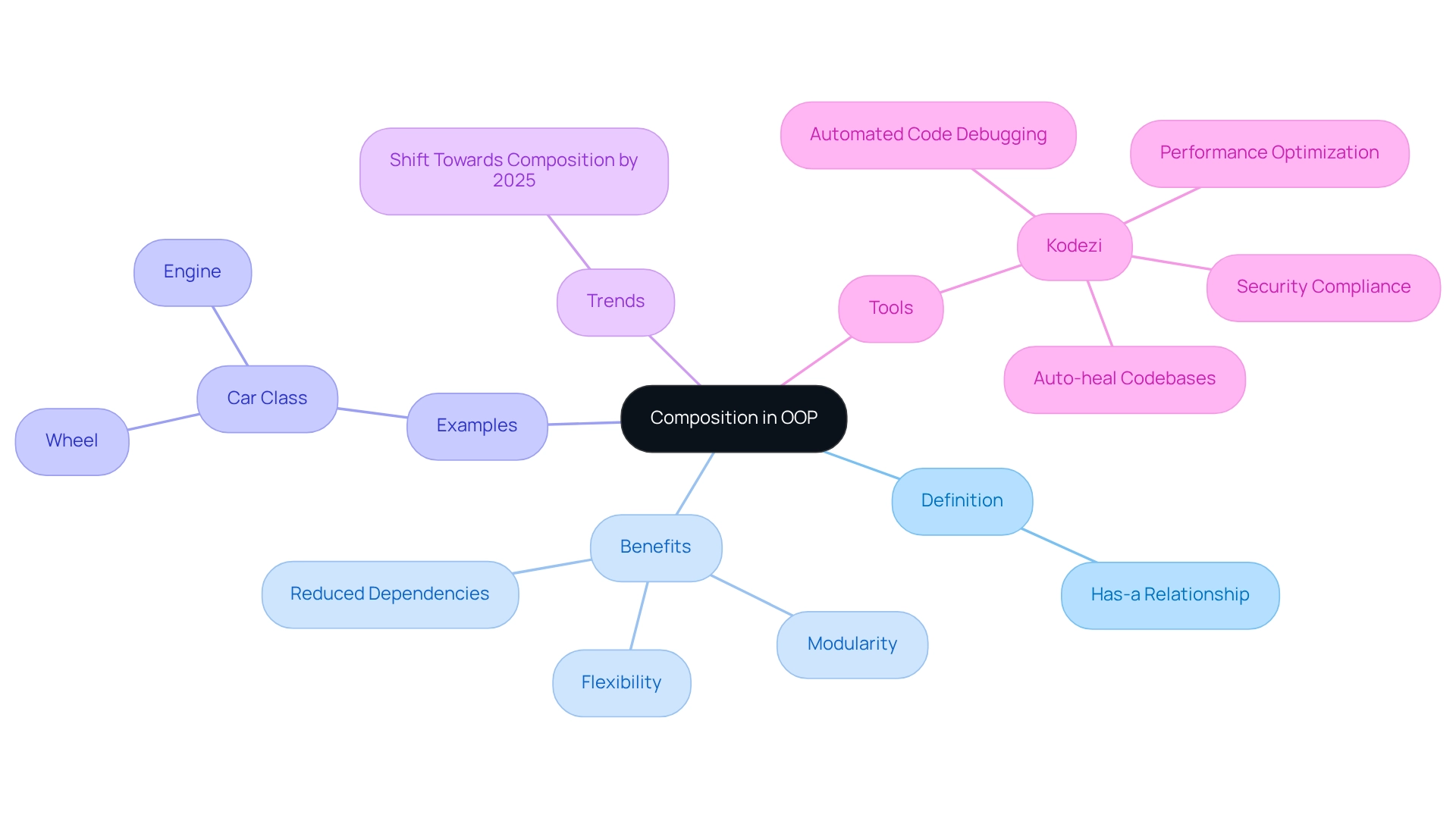
Conclusion
Navigating the complexities of coding can be a daunting challenge for developers. The exploration of object-oriented programming (OOP) principles reveals their critical role in modern software development, particularly in enhancing code quality, maintainability, and security. Kodezi stands out as a powerful tool that facilitates the understanding and application of these principles by streamlining processes such as API documentation, automated builds, and debugging. Through its features, Kodezi empowers developers to implement key OOP concepts like:
- Abstraction
- Encapsulation
- Inheritance
- Polymorphism
- Composition
effectively, leading to more robust and adaptable software solutions.
By leveraging Kodezi, developers can navigate complex coding challenges with ease. Are you ensuring adherence to best practices that enhance productivity and reduce redundancy? The emphasis on encapsulation and method overriding underscores the importance of protecting data and customizing behavior, which ultimately contributes to higher code quality and security. Furthermore, the growing trend towards using interfaces and composition reflects the industry's shift towards modular and flexible design, promoting better organization and maintainability.
In conclusion, the continuous evolution of OOP principles and the tools designed to support them, such as Kodezi, are vital for developers aiming to create efficient and reliable applications. By embracing these practices and utilizing innovative tools, developers can enhance their coding skills, foster collaboration within teams, and ultimately deliver superior software solutions that meet the demands of an ever-changing technological landscape.
Frequently Asked Questions
What challenges do developers face when mastering OOP concepts?
Developers often struggle with understanding and applying the main concepts of Object-Oriented Programming (OOP), which can hinder their coding efficiency and effectiveness.
How does Kodezi help developers with OOP concepts?
Kodezi provides tools like the Professional OpenAPI Specification Generator to simplify API documentation, helping developers understand how OOP principles integrate into API design. It also offers a CLI for auto-healing codebases and AI-driven automated builds and testing, which enhances software quality and security.
What is the significance of the Kodezi CLI?
The Kodezi CLI is a flexible tool that allows teams to quickly identify and resolve codebase issues, enabling them to focus on deploying changes that improve their projects.
How does Kodezi improve productivity and code quality?
By automating tasks such as the generation of OpenAPI specs and facilitating rapid issue resolution, Kodezi helps programmers maintain high productivity levels while deepening their understanding of OOP concepts.
What role does abstraction play in OOP?
Abstraction allows programmers to focus on essential object attributes while concealing complex implementation details, which enhances code maintainability and simplifies the coding process.
How has Kodezi contributed to the understanding of abstraction?
Kodezi automates the creation of abstract classes and provides insights into code issues, thereby boosting productivity and code quality in team environments.
What is encapsulation in OOP?
Encapsulation combines data and functions into a single unit, protecting an object's internal state from unintended interference and misuse, which is crucial for enhancing software security.
Why is encapsulation increasingly important in software development?
Encapsulation helps manage data access and modification, reduces security vulnerabilities, and simplifies code maintenance, which is essential in today's software landscape.
What best practices can developers follow to implement encapsulation?
Developers can use access modifiers to restrict access to sensitive information, apply getter and setter functions for data manipulation, and employ design patterns that promote encapsulation.
How does Kodezi support encapsulation practices?
Kodezi enforces best practices, automates testing, and enhances encapsulation techniques, helping developers create secure and efficient applications while improving their coding skills.




